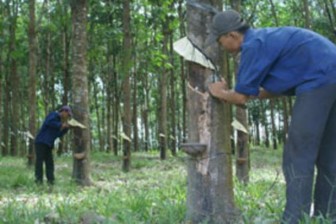A. Ajith Kumar, chairman, Rubber Board, has stressed the need for cooperation at the multilateral-level among like-minded countries to contribute to the development of commodity sectors like natural rubber.
 According to a press note issued here, Mr. Kumar, while inaugurating the 39th Assembly Session of the Association of Natural Rubber Producing Countries (ANRPC) at Guwahati on Tuesday, said the ANRPC has accorded due importance to the developmental activities with small-holder focus and pointed out that the association could contribute tremendously to the natural rubber sectors in member countries.
According to a press note issued here, Mr. Kumar, while inaugurating the 39th Assembly Session of the Association of Natural Rubber Producing Countries (ANRPC) at Guwahati on Tuesday, said the ANRPC has accorded due importance to the developmental activities with small-holder focus and pointed out that the association could contribute tremendously to the natural rubber sectors in member countries.
With new challenges and issues the situation of natural rubber sector in the respective member countries has significantly changed as compared to the time of the establishment of ANRPC. In the present situation, cooperation among member countries should not be limited to upstream but shall be extended to mid-stream and downstream segments as well, said Mr. Kumar. The approach should be to devise strategies to transform the challenges into opportunities through appropriate policies. One of the basic necessities to formulate policies for rubber development is sharing of information among member countries so that time-tested practices, policies and systems could be emulated, calibrating them to the domestic conditions, he added.
San Vanty, chairman of ANRPC, representing Cambodia, chaired the meeting and delivered the introductory statement. Toms Joseph, joint director, Rubber Board, representing India, welcomed the gathering.
Salmiah Ahmad, chief executive officer, International Rubber Consortium Ltd; Abdul Aziz, secretary general, IRRDB; Lekshmi Nair, Head of Economics and Statistics, IRSG; and others spoke. A public-private meet was also held on Tuesday. The closed session of the Assembly is scheduled for October 21. This session will appoint a new Secretary-General and Chairman for ANRPC.
ANRPC is an intergovernmental organization established in 1970 and has at present 11 member countries viz., Cambodia, China, India, Indonesia, Malaysia, Papua New Guinea, Philippines, Singapore, Sri Lanka, Thailand and Vietnam. The member countries of the association account for around 90 per cent of natural rubber production in the world.
Devise strategies to transform the challenges into opportunities, says
A. Ajith Kumar



























